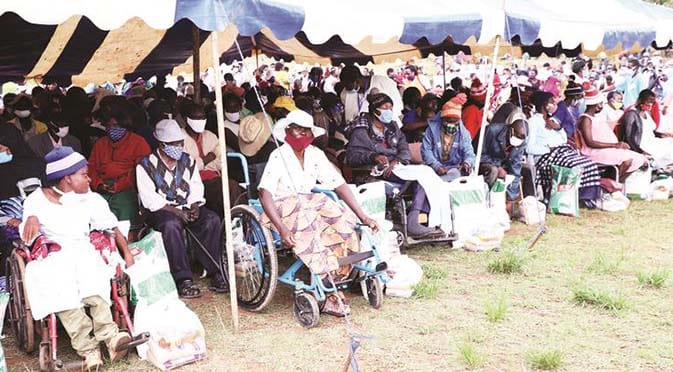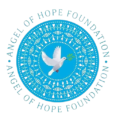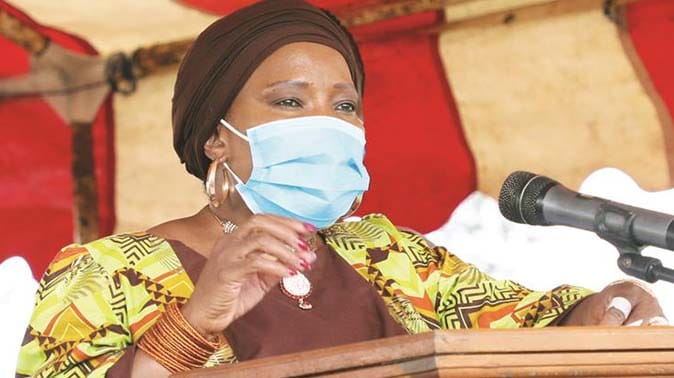Tendai Rupapa in MUTORASHANGA
FIRST LADY Auxillia Mnangagwa yesterday gave villagers here an early Christmas treat and urged them not to lose guard against coronavirus, which is entering a second wave and killing thousands of people across the globe.
She spoke candidly against child marriages and domestic violence which threaten to tear families apart.
The First Lady is the country’s health ambassador and has a passion for the welfare of the elderly, women and children, among many other vulnerable groups.
Addressing people who braved the wet weather conditions after the heavy rains failed to kill her philanthropic side, the First Lady said Covid-19 was far from over and citizens should guard against complacency and help stem the surge in deaths and infections.
“I have come to talk to you about living together well in view of the Covid-19 pandemic so that we have better health,” she said.
“The Covid-19 pandemic is far from over. Let us continue practicing good hygiene and washing our hands.
“We should continue wearing our face masks because we are now in the second wave of the pandemic and we cannot continue losing people. We must promote good health by saying ‘you protect me as I also protect you — Ndidzivirire ini ndigokudzivirirawo’. This means we must use face masks religiously.”
So passionate about saving the lives of Zimbabweans is Amai Mnangagwa that she has spent much of this year, even risking her own life teaching communities about Covid-19.
The First Lady bemoaned the increase in child marriages and discouraged young girls and boys from indulging in sexual activities which resulted in unwanted pregnancies and increased their prospects of contracting diseases.
“Where are our girls?” she said. “Grandparents, our children are being married off at young ages. Elders, let us teach these children. Scores of girls also failed to return to school this year owing to early marriages which took place during the Covid-19 lockdown. We do not encourage you to rush into having sexual relations.”
On domestic violence, the First Lady said elders were supposed to teach the younger couples how to live in peace to curb the practice.
“Our elders, it is your role to teach these youngsters to live in peace,” she said. “Violence leads to the breaking up of marriages. Chiefs’ wives, you also have a role to play in teaching these children.”
The First Lady said domestic violence was not just about the harassment of women by men as there were also women who harassed their husbands.
“Police have a desk set aside to resolve marital disputes. Do not be afraid of reporting. Whenever violence occurs, rush there and you will get help.”
The First Lady advocated for the formulation of committees to end violence in communities and urged these to hold periodic reviews to assess areas that need to be strengthened.
She urged pregnant women to know their status to ensure the unborn child was not infected and to eat healthy food.
The Angel of Hope Foundation’s patron went on to hold an interactive session with elderly women on how to prepare traditional meals for the benefit of the younger generation.
She also spoke candidly against the cutting down of trees.
“Do not cut down trees. Trees are life. Let us plant trees in our communities and fruit trees at our homesteads.”
Amai Mnangagwa spoke about the country’s agricultural production wherein she urged communities to embrace the Pfumvudza farming concept to achieve food self-sufficiency.
She distributed maize seed so that everyone can play a part in contributing to the country’s food reserves and ensure Zimbabwe regains its erstwhile breadbasket status.
On self-help projects, the First Lady urged women to use their hands to realise income for the sustenance of their families.
“As women you should use your hands,” she said. “I am moving about with the wives of chiefs and headmen teaching them to make detergents. They will in turn teach other people in their communities so that we share the knowledge for everyone’s benefit.”
Chief Beperere of Zvimba, Mr Alfred Tome, described the work being done by the First Lady as critical in promoting peace and a reminder of what chiefs and community leaders should do.
“The First Lady raised important issues and for that we want to thank her,” he said. “She has given us a reminder to return to the traditional way where every headman was required to look into whether or not women and girls were not being troubled or abused.”
Mbuya Dephenia Kantayeni thanked the First Lady for her intervention and said she shared her concern over the issue of child marriages.

“Children are getting married while very young. Some parents are actually marrying their children off at tender ages to older men in exchange of invaluable goods and this pains me a lot. I am glad that the First Lady has intervened.
“We want Amai to help the girl child understand that they should be married when grown up and that they should value education.”
Mr Rengesani Dominic echoed similar sentiments.
“On the issue of children being married below the age of 18 years, we are deeply disturbed that children are being abused,” he said.
Gogo Senior Nguste (78) thanked the First Lady for remembering them during this trying period.
“We thank the mother of the nation for her love. She has given us tea, cooking oil, sugar, rice, mealie-meal and many more other goods. We now look forward to a happy Christmas like any other citizen.
“I will slaughter a chicken from my fowl run and prepare a meal for my grandchildren. Amai has given us an early Christmas treat therefore we want God to richly bless her so that she can continue spreading love to those in need countrywide.”
Mashonanaland West Provincial Development Coordinator Mr Josphat Jaji, speaking on behalf of Minister of State for Mashonaland West Provincial Affairs and Devolution Minister Mary Mliswa-Chikoka praised the First Lady for remembering the less privileged.
Amai Mnangagwa includes experts in various fields in her programmes as part of her resolve to get people enlightened on different aspects affecting them.
Ministry of Health and Child Care representative Dr Terrence Dandaza told the gathering that they encouraged people to have regular health checks, unlike in the past when people only visited clinics when sick.
“Back in the day people used to visit clinics only when sick, but now we encourage regular health checks for early detection of diseases and early commencement of treatment,” he said.
National Aids Council (NAC) representative Mr Davison Mambudzi told the community members that knowing one’s HIV status was critical for the promotion of good health.
Another stakeholder, Women’s Bank chief executive Mrs Mandas Marikanda spoke on the funding of projects and said her bank was ready to assist women establish themselves.
Deputy Minister of Local Government and Public Works Marian Chombo, who is the legislator for the area was also in attendance.

